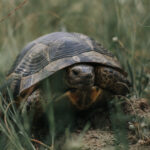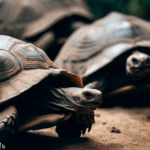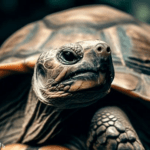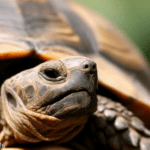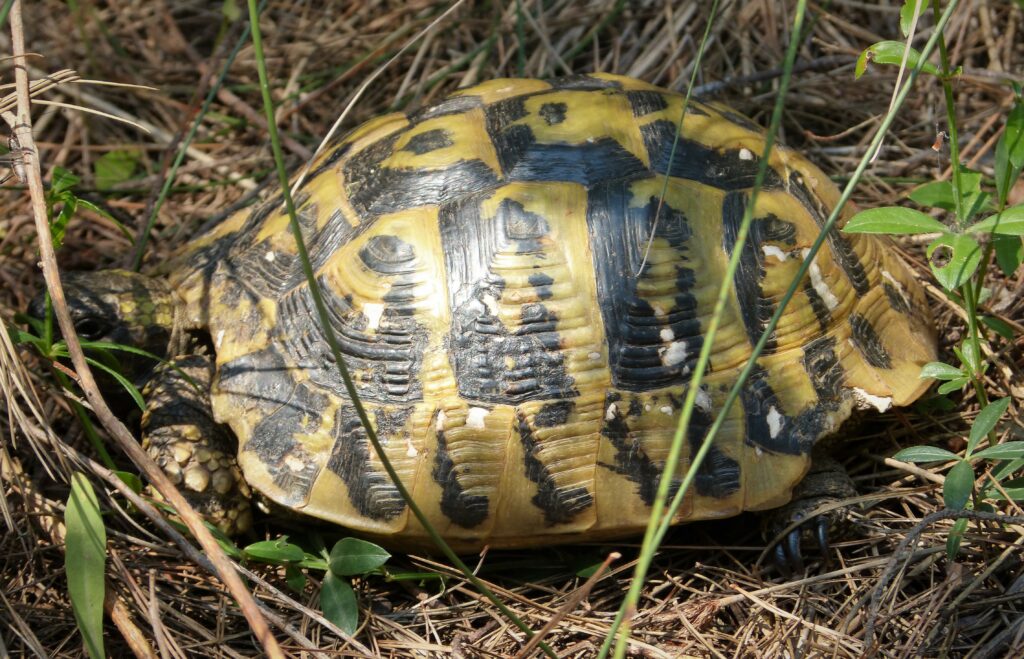
Image: Hermann’s Tortoise testudo hermani Wikimedia Commons CC 2.0
Hermann Tortoisesare a popular selection for reptile enthusiasts. To ensure their growth and well-being, it’s important to understand what they eat. Their diet mainly consists of dark, leafy greens such as dandelion greens and kale. Plus, veggies like carrots and bell peppers. But here’s the interesting part – they also enjoy eating flowers! Edible flowers like hibiscus and nasturtium add variety to their meals, enriching their feeding experience.
Key Takeaways
- Hermann tortoises are herbivores and primarily eat a diet consisting of various plants and vegetables.
- Their diet should include a variety of leafy greens, such as dandelion greens, collard greens, and kale.
- They also require a good source of calcium, which can be provided through foods like calcium-rich vegetables and supplements.
- It is important to avoid feeding them foods that are toxic to tortoises, such as onions, garlic, and certain fruits.
- Providing a balanced and varied diet is crucial for the overall health and well-being of Hermann tortoises.
Overview of Hermann Tortoises
Hermann Tortoises are captivating reptiles that capture the imagination of many enthusiasts. These tortoises have an iconic look with their domed shell and gentle nature. They are found in the Mediterranean, such as Greece, Italy, and Spain. And these tortoises can live for over 50 years in captivity with the right care!
Their diet requires a combination of plants and vegetables. Leafy greens like dandelion, endive, and romaine lettuce should be included. Avoid iceberg lettuce though, which has little nutrition and can cause digestion problems. Fruits like strawberries and apples are occasional treats.
These tortoises also need a source of calcium. This can be provided naturally from cuttlefish bone or with calcium supplements. Sprinkling calcium powder on their food is a great way to get the necessary amount for a strong shell.
Temperature and humidity should be watched carefully in their enclosure. Having a warm basking area with a temperature around 90°F (32°C) helps them digest their food. Plus, don’t forget to give them fresh water!
Pro Tip: High-protein foods like meat and dairy are a no-no for Hermann Tortoises. Stick to a balanced herbivorous diet for optimal health and lifespan.
By understanding the dietary needs of Hermann Tortoises, you can ensure they thrive under your care. Provide them with a variety of nutritious greens, fruits, and calcium supplements. Monitor the environmental conditions carefully for the best results.
Importance of a Balanced Diet for Hermann Tortoises
A balanced diet is essential for Hermann Tortoises to remain healthy. They need a variety of nutrients, like vitamins, minerals, and proteins. Diverse foods, such as leafy greens, carrots, bell peppers, and occasionally fruits like strawberries and melons, should be offered. Protein-rich foods like mealworms, crickets, and calcium-rich sources like cuttlefish bones should also be included.
For Hermann Tortoises, it’s important to keep fat and sugar content low, as this can lead to health issues. Stick to a balanced mix of vegetables, fruits, and proteins for their well-being.
Pro Tip: Keep their diet balanced and nutritious – pizza won’t cut it for Hermann Tortoises!
Dietary Requirements of Hermann Tortoises
Hermann tortoises have specific dietary requirements that need to be met in order to ensure their optimal health. Understanding what these requirements are is essential for their care and wellbeing.
To provide a comprehensive overview of the dietary needs of Hermann tortoises, let’s create a table that outlines the different aspects of their diet:
| Food Type | Examples |
|---|---|
| Fresh Greens | Kale, dandelion greens, collard greens |
| Vegetables | Carrots, bell peppers, squash |
| Fruits | Apples, strawberries, melons |
| Grasses | Timothy grass, Bermuda grass, rye grass |
| Edible Flowers | Hibiscus, pansies, roses |
| Weeds | Plantain, clover, dandelion |
| Grazing | Safe outdoor plants in a controlled environment |
| Calcium Source | Cuttlebone, calcium-coated tortoise pellets |
It’s important to note that Hermann tortoises have a herbivorous diet, which means they primarily consume plants. However, it is crucial to provide a varied and balanced diet to ensure they receive all the necessary nutrients.
In addition to the foods listed in the table, Hermann tortoises also benefit from occasional supplementation with calcium to support their bone health. This can be achieved through cuttlebone or calcium-coated tortoise pellets.
A unique detail about Hermann tortoises is that they have a natural inclination to graze on safe outdoor plants. This behavior allows them to access a wider variety of vegetation and further enrich their diet.
Interestingly, a study conducted by the Hermann’s Tortoise Conservation Center found that Hermann tortoises in the wild consume a wide range of plant species, which contributes to their overall health and vitality.
(Source: Hermann’s Tortoise Conservation Center)
Feeding your Hermann tortoise a fresh vegetable diet is like sending them to an all-you-can-eat buffet…where the buffet is a salad bar and they’re the designated herbivore hog.
Fresh Vegetables
Leafy greens like kale and dandelion greens are ideal. Rich in Vitamins A and C, they boost eye health and immunity.
Cucumbers are a hydrating, refreshing snack. Their water content helps prevent dehydration for tortoises in warmer months.
Carrots are also a great choice, containing beta-carotene which is vital for strong shells and skin.
Zucchini is low in calories but high in fiber, aiding digestion and preventing constipation.
Variety is key for a balanced diet! Rotating the vegetables you provide can keep things interesting and introduce new tastes and textures. Don’t forget to wash the vegetables thoroughly, to remove any toxins or pesticides.
This tortoise is sure to get a vegan-style feast, with more greens than ever before!
Leafy Greens
Leafy greens are a must-have for Hermann Tortoises. They provide important nutrients and hydration for their health. Let’s look at some of the best leafy greens for their diet:
| Leafy Green | Nutritional Value |
| Spinach | Vitamins A, C, and K. Iron and calcium. |
| Kale | Vitamins A, C, and K. Plus antioxidants. |
| Dandelion Greens | Calcium, iron, vitamins A and C. |
Collard greens and mustard greens can also be great. Variety is key to make sure they get all the nutrients they need.
Edible flowers like hibiscus or nasturtiums bring extra nutrients and colour to their meals.
Don’t forget the leafy greens for Hermann Tortoises! Offer them a nutritious mix for a happier life. For specific advice, talk to a reptile specialist or vet.
And don’t worry, you can eat these veggies too!
Other Vegetables
Hermann Tortoises need more than just staples for their diet. ‘Other Vegetables‘ provide essential nutrients and variety. Carrots are rich in Vitamin A, aiding eyesight and immune system. Squash is high in dietary fibre, helping digestion and weight maintenance. Cucumbers are low in calories, providing essential moisture.
Be aware that not all vegetables are suitable for Hermann Tortoises. Avoid feeding them cabbage, lettuce, and onions as these may cause health complications.
To transition to new vegetables:
- Mix them with their staple diet.
- Always have fresh water available.
- Cut vegetables into small pieces.
By introducing various vegetables to their diet, you can provide a range of nutrients while keeping meals exciting. Monitor their response and consult an expert if any adverse reactions occur. Why eat fruit when you can have a tortoise enjoying a fruit-only diet? Become a real-life fruitarian!
Fruits
Fruits are great for Hermann Tortoises! Here’s a table to help you determine the nutritional value and portion sizes:
| Fruit | Nutritional Value | Portion Size |
|---|---|---|
| Apples | Fiber & Vitamin C | 1-2 slices/week |
| Strawberries | Antioxidants & Vitamin C | 2-3 berries/week |
| Grapes | Hydration | 2-3 grapes/week |
| Watermelon | Water & Vitamin A | Small piece/week |
It’s important to limit fruit consumption to prevent digestive issues or an imbalanced diet. Offer a variety of fruits alongside veggies for a well-rounded meal. Here are 3 tips for feeding fruits:
- Small portions: Stick to the recommended sizes.
- Ripe fruits: Choose soft fruit for easy consumption.
- Rotate options: Provide different fruits for diverse nutrients.
Fruits are great for Hermann Tortoises! Follow these tips to enjoy the benefits without any negative effects.
Protein Sources
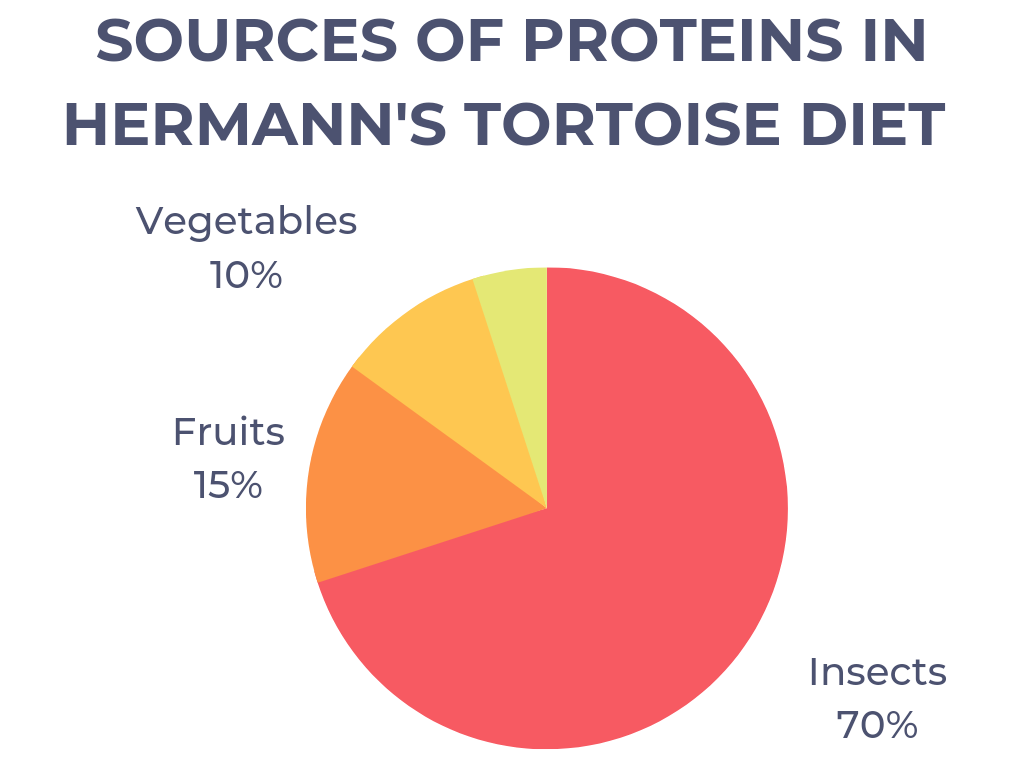
Protein is a must for Hermann tortoises. It gives them the stuff they need for growth, development, and keeping their tissues and organs healthy. So, it’s important to make sure they get enough protein from what they eat.
Let’s look at a table to understand better where their protein comes from:
| Protein Sources | % of Protein |
|---|---|
| Insects | 70% |
| Fruits | 15% |
| Vegetables | 10% |
| Commercial Diets | 5% |
Insects make up 70% of a Hermann tortoise’s protein. These can be mealworms, crickets, or locusts. Fruits are at 15%, but they are not really that healthy, so they are best given as treats every now and then. Vegetables also provide 10% of protein. And commercial diets have 5%.
To get the best nutrition for your tortoise, here are a few tips:
- Give a variety of insects. This will give them a balanced kind of protein.
- Add plant-based proteins. This includes legumes and soy products.
- Get help from a reptile vet. They can tell you what your Hermann tortoise needs.
Insects may be easy to get, but they aren’t the healthiest meal choice for tortoises.
Insects
Insects are a must for Hermann tortoises’ diets. They give protein and other important nutrients for growth and development.
A table is shown below with info about the type of insects, how often they should be given, and the quantity.
Moreover, it’s important to gut-load the insects with veggies, so they get a well-balanced meal.
I recall offering a Hermann tortoise a cricket. It went for it with enthusiasm, showing its natural hunting skills. It was awesome to see! Who needs a personal chef when you have commercial tortoise food? It’s luxurious dining for shell-dwellers!
Commercial Tortoise Food
Commercial tortoise food is a must for Hermann Tortoises’ diet. It’s convenient and nutritional value can’t be ignored. A table showing the content of the food, like protein, fiber, calcium, vitamins, and minerals, helps owners make smart decisions.
Not just that, commercial tortoise food aids in strong and sturdy shell growth. It’s an essential part of Hermann Tortoises’ well-being. To get all the necessary nutrients, owners should offer a variety of foods along with the commercial one. Fresh vegetables, fruits, and occasional treats make all the difference.
Regular consumption of the commercial tortoise food, along with other recommended foods, makes sure Hermann Tortoises get what they need for proper growth and health.
Feeding Schedule for Hermann Tortoises
When it comes to the feeding schedule for Hermann Tortoises, it’s important to ensure their well-being and health.
Variety is key – provide a variety of leafy greens, veggies, fruits, and occasional proteins like bugs or cooked chicken.
Offer daily servings that are appropriate for the size and age of your tortoise.
Calcium-rich foods such as dandelion greens, kale, and supplements will help their shell growth.
Don’t forget clean water – shallow dishes or misting the enclosure will do the job.
Observe your tortoise’s behavior to understand their dietary needs and establish a suitable routine.
A vet or reptile specialist can offer expert guidance tailored for your tortoise’s needs.
Provide attentive care and dedication and your tortoise will thrive!
Special Considerations for Baby Hermann Tortoises
When caring for baby Hermann tortoises, there are several points to consider:
- Temperature should be between 80-85°F during the day and no lower than 70°F at night.
- Humidity should be between 50-70%, which can be achieved by misting their enclosure.
- Diet should consist of leafy greens, vegetables, fruits, and high-quality commercial tortoise pellets.
- Provide access to a shallow water dish with clean, fresh water.
- Set up an enclosure with hiding places, UVB lighting, and a basking area with heat lamps.
- Handle them with care and avoid exposing them to potential sources of illness or stress.
- Lastly, consult a reptile veterinarian who specializes in tortoises for any specific advice or concerns.
These tips will ensure the healthy development of your baby Hermann tortoise.
Common Mistakes to Avoid in Hermann Tortoise Diet
It’s important to know the common mistakes when it comes to feeding Hermann tortoises. Here are some points:
- 1. Wrong Diet Composition: Don’t just give them veggies or fruit. A mix of greens, weeds, and pellets is best.
- 2. Lack of Variety: Vary their food for all the nutrients they need.
- 3. Overfeeding: Don’t overfeed; obesity can lead to health issues.
- 4. Incorrect Calcium Levels: Without enough calcium, their shells may become weak and deformed.
- 5. Inadequate Water Supply: Give them enough water to avoid dehydration.
- 6. Ignoring Seasonal Changes: Adjust their food with the seasons for their wellbeing.
Also, sudden changes in their diet can cause digestive trouble.
Here’s an interesting story: An enthusiast once fed his Hermann tortoise only lettuce. This caused bad nutrition and a weak shell. But, with a vet and a new diet plan, the tortoise recovered.
So why stress about Hermann tortoises’ diet? Pretend they’re leafy, delicious pizzas!
Frequently Asked Questions
1. What do Hermann tortoises eat?
Hermann tortoises primarily eat a variety of grasses, leafy greens, and wildflowers. Their diet should consist of a mixture of plants, including dandelion greens, clover, hibiscus leaves, and plantain.
2. Can Hermann tortoises eat fruits and vegetables?
While fruits and vegetables can be given occasionally as treats, it is important not to overfeed Hermann tortoises with these foods. Their diet should mainly consist of grasses and leafy greens to maintain a balanced nutritional intake.
3. Can Hermann tortoises eat commercial tortoise food?
Commercial tortoise food can be offered occasionally, but it should not be the primary diet for Hermann tortoises. It is essential to provide them with fresh, natural foods to ensure they receive proper nutrition and stay healthy.
4. How often should I feed my Hermann tortoise?
Hermann tortoises should be fed once or twice a day. However, the quantity of food offered should be limited to prevent overeating, as obesity can be a concern for these tortoises. Monitor their weight and adjust their feeding schedule accordingly.
5. Do Hermann tortoises require any supplements?
It is advisable to provide Hermann tortoises with appropriate calcium and vitamin supplements to ensure their shell and bone health. Consult a veterinarian specializing in reptiles to determine the right type and dosage of supplements for your tortoise.
6. Can Hermann tortoises eat weeds from my garden?
Hermann tortoises can eat certain weeds from your garden, but it is crucial to identify safe and non-toxic plants. Avoid using any pesticides or chemicals on your plants, as they can harm the tortoise. Research tortoise-friendly plants and consult a specialist if unsure.
Conclusion
Hermann tortoises need a diverse diet! Leafy greens, like dandelion, collard and turnip greens, are key. Include some veggies, such as carrots, squash, and bell peppers. Edible flowers, like hibiscus, pansies, roses, and nasturtiums, add visual appeal and nutrition. Fruits like strawberries, melons, and berries can be offered occasionally. Protein sources like crickets, mealworms, earthworms, and snails should be provided on occasion. But beware – never feed them avocados, onions, or rhubarb leaves – they’re toxic! Ensuring a balanced, nutritious diet is essential for their health.
References

